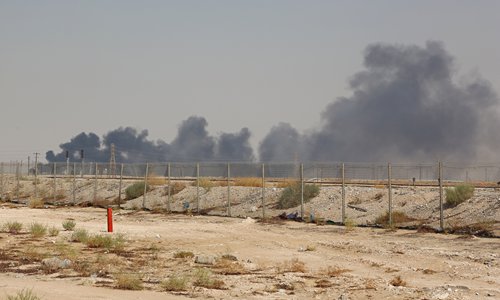HOME >> OPINION
Saudi oil attacks worsen regional ferment
By Shu Meng Source:Global Times Published: 2019/9/23 19:58:40

Smoke billows from an Aramco oil facility in Abqaiq about 60 kilometers southwest of Dhahran in Saudi Arabia's Eastern province on September 14, 2019. Photo: AFP
An oil field and an oil processing facility in Saudi Arabia were attacked on September 14, resulting in blazes, which hit the country's daily oil output. After the incident, US Secretary of State Mike Pompeo denounced the attacks as an "act of war."
Although the attacks only temporarily affected Saudi Arabia's daily oil production, and it was reported by Reuters the country will restore its lost oil production by the end of September, Saudi Arabia's losses go far beyond.
The two attacked oil facilities belong to Saudi petroleum giant Aramco, which was going to float the world's largest IPO. However, this attack hurt the company's market capitalization and dented investors' confidence in the Saudi energy sector, because it's not the first time that such attacks have taken place. In May, two oil pumping stations of Saudi Aramco in Dawadmi and Afif Governorates in Riyadh were targeted in drone attacks. However, neither Saudi Arabia's own air defense radar system nor the US-made "Patriot" air defense missile system installed by the regional power worked to thwart the strikes, exposing the vulnerability of the energy sector.
There are severe divergences over who launched the September 14 attacks. The US and Iran have launched a war of words. The Saudi investigation showed that according to the weapons debris, Iran was behind the attacks; however, Tehran has denied the Saudi accusation. Yemen's Houthi militia claimed responsibility for the assaults, which was rejected by the US government.
Since the US government ruled out any exemption from its punitive sanctions on Iran for countries buying oil from it this year, regional conflicts and disputes have been emerging. The oil field attacks have intensified regional tensions. US President Donald Trump announced new sanctions on Iran's central bank on Friday, calling the measures the toughest ever imposed on another country by the US. Iran has also hardened its stance, saying it is ready for a "full-fledged" war.
The fragile situation in the tinderbox region was exposed by attacks on the Saudi oil infrastructure. The oil belt in the Gulf is of great economic and strategic significance for global energy security, and its oil reserves account for two-thirds of the world total. Strait of Hormuz is an important channel for energy transportation. Therefore, interests of all major global powers are related to the region.
The US has been adopting the "maximum pressure" policy for some time in containing Iran, aimed at pushing Iran to compromise. The September 14 attacks provided a new excuse for the "maximum pressure" policy, so that the US asserted that Iran must take responsibility for this attack. However, Iran's attitude is equally tough. Tehran has done away with restrictions on nuclear research and development to pile pressure on the international community. At the same time, it is using external tensions to shift attention from the domestic economic downturn and the decline in living standards.
Fortunately, in the confrontation between the US and Iran, military means is not the best choice for both sides. The goal of the US "maximum pressure" policy is to press the Iranian government, so it will not randomly cross the line. At the same time, Iran will not start the war. However, both sides have been in a deadlocked confrontation for a period of time, which is dangerous for regional security.
The situation in the region is changing rapidly, and conflicts can start any time. The recent attacks also revealed the destructive power of asymmetric warfare. In the future, the threats that asymmetric warfare poses to the region and countries may emanate from various aspects. Although both the US and Iran have no intention of starting a war, under the circumstances, no one knows which incident will become the last straw and trigger a full-blown military confrontation.
In the latest Saudi oil installation attacks, the real culprit is no longer important. What matters is how the two sides treat the "true culprit" that they have identified. For the fragile situation in the Gulf, it cannot withstand more turmoil.
The author is an assistant research fellow at the Middle East Studies Institute of Shanghai International Studies University. opinion@globaltimes.com.cn
RELATED ARTICLES:
Posted in: VIEWPOINT